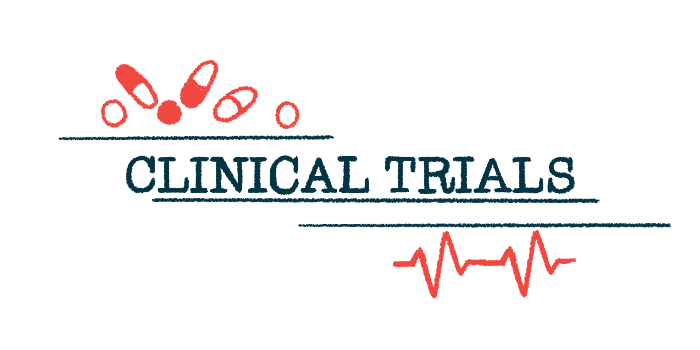Long-term ALS survival benefit with CNM-Au8 seen in trial analyses
HEALEY ALS trial now tested therapy for up to 2.5 years in patients
Written by |

Up to about 2.5 years of treatment with CNM-Au8 in an open-label extension of the HEALEY ALS platform trial significantly reduced the risk of death for individuals with amyotrophic lateral sclerosis (ALS) relative to a historical placebo group of patients from previous ALS clinical trials, according to new analyses.
These long-term analyses add to previous findings from the platform trial, which found the experimental therapy from Clene Nanomedicine reduced the risk of death for these ALS patients by more than 90% compared with a placebo in the first six months.
Similar results were observed when pooled data from CNMAu8’s arm in HEALEY (NCT04414345) and the RESCUE-ALS Phase 2 clinical trial (NCT04098406) were compared with the historical placebo-treated patients.
“To show such profound survival improvement using the HEALEY ALS Platform Trial data set alone and a pooled HEALEY and RESCUE data set is remarkable,” Benjamin Greenberg, MD, head of medical at Clene, said in a company press release.
“Clene is extremely gratified to see this consistent long-term survival data from the HEALEY ALS Platform Trial [open-label extension], with a continued clean safety profile, adding to the totality of the survival evidence,” Greenberg added.
New analyses also used data from RESCUE-ALS Phase 2 trial
CNM-Au8 is an oral liquid suspension of gold nanocrystals, which is expected to support the energetic needs of nerve cells and protect them against forms of cellular stress implicated in the neurodegenerative disease.
The ongoing HEALEY ALS Platform Trial (NCT04297683), launched in 2020, is designed to simultaneously test multiple ALS treatment candidates using a shared placebo group. This strategy helps to cut costs and accelerate therapeutic development.
Adults with ALS, with symptom onset in the prior three years, are screened through the trial’s master protocol, and if eligible, are randomly assigned to one of the trial arms that is actively enrolling. Recruitment is ongoing across 67 study locations in U.S. sites.
A CNM-Au8 arm was among the trial’s first, and ultimately enrolled 161 patients. Of them, about 75% were randomly assigned to receive CNM-Au8 at doses of 30 mg or 60 mg for six months, while the other 25% were given a placebo. After the main trial, 92% of the participants continued on in an open-label extension (OLE) trial, where all were given CNM-Au8 at the 30 mg dose.
The main trial did not meet its main goal of slowing functional declines, nor did it demonstrate benefit in measures of lung function.
Still, exploratory analyses indicated that the 30 mg dose was associated with a more than 90% lower risk of death and combined risk of death or need for permanently assisted ventilation relative to a placebo after six months. It also was associated with a 74% lower risk of overall clinical worsening.
Because the therapy’s placebo-controlled portion was just six months, it would be difficult to ascertain CNM-Au8’s potential long-term survival benefits for ALS patients across the OLE portion. A common solution to this issue is to compare the therapy to an external, historical placebo group.
In the new analyses, the researchers compared CMN-Au8 treatment data from the HEALEY trial with placebo-treated patients from PRO-ACT, the largest U.S. clinical database of previous ALS trials.
The database contains data from 29 completed Phase 2 and 3 ALS clinical trials, including records from more than 11,600 ALS patients.
Treatment with CNM-Au9 led to 49% lower risk of death for patients
For the analysis, 59 people who were originally treated with CNM-Au8 30 mg in the placebo-controlled part of HEALEY were compared with matched placebo participants in the PRO-ACT database.
These results showed that CNM-Au8-treated participants demonstrated a statistically significant, 49% lower risk of death compared with PRO-ACT participants with up to 133 weeks, or about 2.5 years, of treatment.
A similar analysis was performed that pooled 82 CNM-Au8-treated patients across the HEALEY and RESCUE trials. Again, the therapy was associated with a statistically significant 59% reduction in mortality risk relative to matched placebo-treated patients from PRO-ACT.
Improved survival status is an important measure of drug effect. … We are pleased to see these data from our long-term follow-up as further support of a survival signal in our HEALEY ALS Platform Trial.
Previous analyses from RESCUE and its open-label extension trial (NCT05299658) have similarly indicated a survival benefit of CNM-Au8.
“Improved survival status is an important measure of drug effect,” said Merit Cudkowicz, MD, neurology chair at Massachusetts General Hospital, director of the Sean M. Healey & AMG Center for ALS, and the principal investigator of the HEALEY ALS Platform Trial.
“We are pleased to see these data from our long-term follow-up as further support of a survival signal in our HEALEY ALS Platform Trial,” Cudkowicz said.
Over more than 500 years of collective exposure to CNM-Au8 across ALS, multiple sclerosis, and Parkinson’s disease clinical trials and expanded access programs, no safety signals or serious adverse events from the experimental therapy have been observed.
“I am also happy to see how helpful a shared open-source dataset such as PRO-ACT is to the field to analyze data from the [open-label extension] portions of clinical trials,” Cudkowicz said.
“We encourage all companies working in ALS to contribute their data to PRO-ACT once their trial is complete. I want to also thank all the people with ALS who are part of clinical trials and are helping the community find new treatments,” she added.







